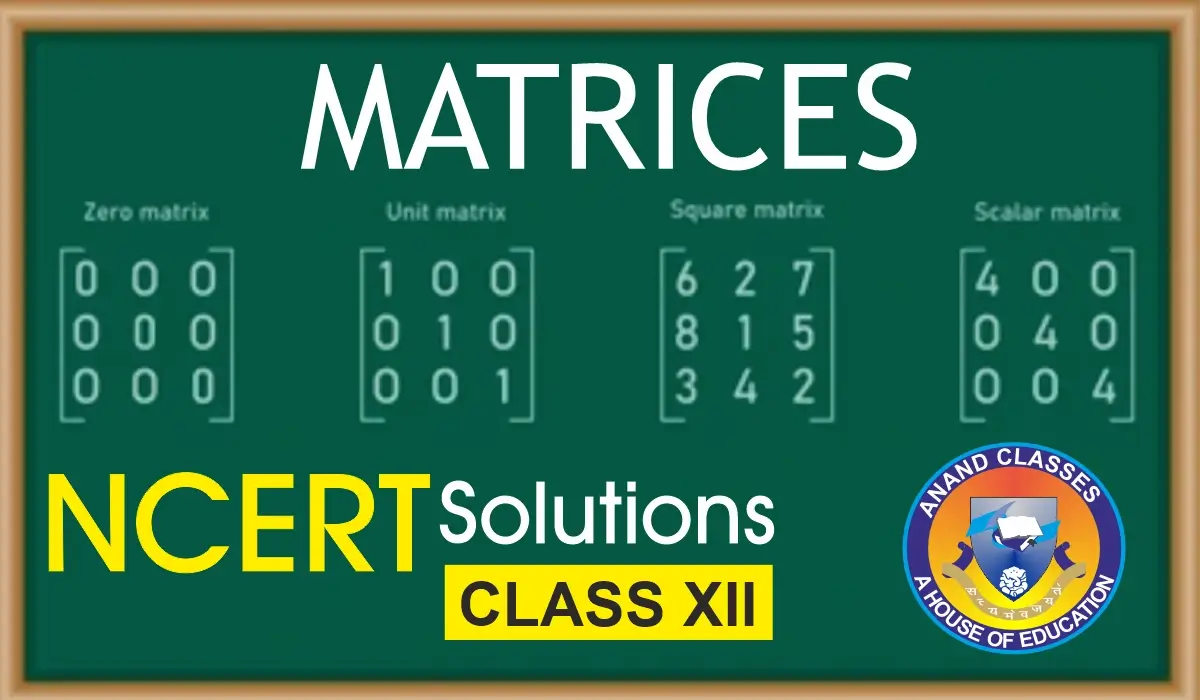Anand Classes offers a complete and free-downloadable PDF of NCERT Solutions for Class 12 Maths Chapter 7 – Integrals, Exercise 7.1 (Set-1), created by expert educators to guide you through the fundamental techniques of integration, such as finding antiderivatives, applying linear operators of integrals, and breaking down complex integrals using properties of integrals as inverse of differentiation. These solutions align perfectly with the latest CBSE / NCERT syllabus and are crafted to support solid preparation for board exams and competitive tests. Click the print button to download study material and notes.
NCERT Question.1 : Finding the Anti-Derivative (Integral) by Inspection of function $\sin 2x$.
Solution :
Anti-derivative of $\sin 2x$ is a function of $x$ whose derivative is $\sin 2x$.
It is known that,
$$\frac{d}{dx}(\cos 2x) = -2 \sin 2x$$
Therefore,
$$\sin 2x = -\frac{1}{2} \frac{d}{dx}(\cos 2x)$$
or
$$\sin 2x = \frac{d}{dx}\left(-\frac{1}{2} \cos 2x\right)$$
Hence, the anti-derivative of $\sin 2x$ is
$$-\frac{1}{2} \cos 2x + C$$
NCERT Question.2 : Finding the Anti-Derivative (Integral) by Inspection of function $\cos 3x$.
Solution :
Anti-derivative of $\cos 3x$ is a function of $x$ whose derivative is $\cos 3x$.
It is known that,
$$\frac{d}{dx}(\sin 3x) = 3 \cos 3x$$
Therefore,
$$\cos 3x = \frac{1}{3} \frac{d}{dx}(\sin 3x)$$
or
$$\cos 3x = \frac{d}{dx}\left(\frac{1}{3} \sin 3x\right)$$
Hence, the anti-derivative of $\cos 3x$ is
$$\frac{1}{3} \sin 3x + C$$
NCERT Question.3 : Finding the Anti-Derivative (Integral) by Inspection of function $e^{2x}$.
Solution :
Anti-derivative of $e^{2x}$ is a function of $x$ whose derivative is $e^{2x}$.
It is known that,
$$\frac{d}{dx}(e^{2x}) = 2 e^{2x}$$
Therefore,
$$e^{2x} = \frac{1}{2} \frac{d}{dx}(e^{2x})$$
or
$$e^{2x} = \frac{d}{dx}\left(\frac{1}{2} e^{2x}\right)$$
Hence, the anti-derivative of $e^{2x}$ is
$$\frac{1}{2} e^{2x} + C$$
NCERT Question.4 : Finding the Anti-Derivative (Integral) by Inspection of function $(ax + b)^2$.
Solution :
Anti-derivative of $(ax + b)^2$ is a function of $x$ whose derivative is $(ax + b)^2$.
It is known that,
$$\frac{d}{dx}((ax + b)^3) = 3a (ax + b)^2$$
Therefore,
$$(ax + b)^2 = \frac{1}{3a} \frac{d}{dx}((ax + b)^3)$$
or
$$(ax + b)^2 = \frac{d}{dx}\left(\frac{1}{3a}(ax + b)^3\right)$$
Hence, the anti-derivative of $(ax + b)^2$ is
$$\frac{1}{3a}(ax + b)^3 + C$$
NCERT Question.5 : Finding the Anti-Derivative (Integral) by Inspection of function $\sin 2x – 4 e^{3x}$.
Solution :
Anti-derivative of $\sin 2x – 4 e^{3x}$ is a function of $x$ whose derivative is $\sin 2x – 4 e^{3x}$.
We know,
$$\frac{d}{dx}(\cos 2x) = -2 \sin 2x$$
Dividing by $-2$,
$$\frac{d}{dx}\left(-\frac{1}{2} \cos 2x\right) = \sin 2x \quad \text{…(i)}$$
Again,
$$\frac{d}{dx}(e^{3x}) = 3 e^{3x}$$
So,
$$\frac{d}{dx}\left(\frac{1}{3} e^{3x}\right) = e^{3x}$$
Multiplying by $-4$,
$$\frac{d}{dx}\left(-\frac{4}{3} e^{3x}\right) = -4 e^{3x} \quad \text{…(ii)}$$
Adding (i) and (ii),
$$\frac{d}{dx}\left(-\frac{1}{2} \cos 2x – \frac{4}{3} e^{3x}\right) = \sin 2x – 4 e^{3x}$$
Hence, the anti-derivative of $\sin 2x – 4 e^{3x}$ is
$$-\frac{1}{2} \cos 2x – \frac{4}{3} e^{3x} + C$$
Boost your preparation with Anand Classes — access expertly designed notes, integrals practice sets, and concept-based materials perfect for JEE, CBSE, and competitive exam success.
NCERT Question 6: Find the Integral
$$\int (4e^{3x} + 1)dx$$
Solution:
$$
\int (4e^{3x} + 1)dx
= 4\int e^{3x}dx + \int 1dx
$$
Now,
$$
\int e^{3x}dx = \frac{e^{3x}}{3}
$$
Substituting this, we get:
$$
4\int e^{3x}dx + \int 1dx = 4\left(\frac{e^{3x}}{3}\right) + x + C
$$
Simplifying,
$$
\boxed{\frac{4}{3}e^{3x} + x + C}
$$
Master your calculus with Anand Classes — explore detailed NCERT-based integral solutions, step-by-step derivations, and expertly prepared notes ideal for JEE, CBSE, and advanced math learning.
NCERT Question 7: Find the Integral
$$\int x^2 \left(1 – \frac{1}{x^2}\right)dx$$
Solution:
$$
\int x^2 \left(1 – \frac{1}{x^2}\right)dx
= \int (x^2 – 1)dx
$$
$$
= \int x^2dx – \int 1dx
$$
$$
= \frac{x^3}{3} – x + C
$$
Hence,
$$
\boxed{\frac{x^3}{3} – x + C}
$$
Strengthen your fundamentals with Anand Classes — detailed NCERT integral solutions, conceptual step-by-step derivations, and high-quality study notes for JEE, CBSE, and advanced mathematics preparation.
NCERT Question 8: Find the Integral
$$\int (ax^2 + bx + c)dx$$
Solution:
$$
\int (ax^2 + bx + c)dx
= a\int x^2dx + b\int xdx + c\int 1dx
$$
$$
= a\left(\frac{x^3}{3}\right) + b\left(\frac{x^2}{2}\right) + cx + C
$$
Simplifying,
$$
\boxed{\frac{a x^3}{3} + \frac{b x^2}{2} + c x + C}
$$
Get step-by-step NCERT integration solutions and expert guidance from Anand Classes — perfect for mastering JEE, CBSE, and competitive exams.
NCERT Question 9: Find the Integral
$$\int (2x^2 + e^x)\;dx$$
Solution:
$$
\int (2x^2 + e^x)\;dx
= 2\int x^2\;dx + \int e^x\;dx
$$
$$
= 2\left(\frac{x^3}{3}\right) + e^x + C
$$
Simplifying,
$$
\boxed{\frac{2x^3}{3} + e^x + C}
$$
Build your conceptual clarity with Anand Classes — detailed NCERT calculus solutions, step-by-step integrations, and expert study notes for JEE, CBSE, and advanced math preparation.
NCERT Question 10: Find the Integral
$$\int \left(\sqrt{x} – \frac{1}{\sqrt{x}}\right)^2\;dx$$
Solution:
Expanding the square,
$$
\left(\sqrt{x} – \frac{1}{\sqrt{x}}\right)^2 = x + \frac{1}{x} – 2
$$
Therefore,
$$
\int \left(\sqrt{x} – \frac{1}{\sqrt{x}}\right)^2\;dx
= \int \left(x + \frac{1}{x} – 2\right)\;dx
$$
$$
= \int x\;dx + \int \frac{1}{x}\;dx – 2\int 1\;dx
$$
$$
= \frac{x^2}{2} + \ln|x| – 2x + C
$$
Hence,
$$
\boxed{\frac{x^2}{2} + \ln|x| – 2x + C}
$$
Advance your calculus skills with Anand Classes — comprehensive NCERT integration examples, step-by-step derivations, and top-quality notes ideal for JEE, CBSE, and competitive exam success.
NCERT Question 11: Find the Integral
$$\int \frac{x^3 + 5x^2 – 4}{x^2}dx$$
Solution:
Simplify the integrand:
$$
\frac{x^3 + 5x^2 – 4}{x^2} = x + 5 – 4x^{-2}
$$
Therefore,
$$
\int \frac{x^3 + 5x^2 – 4}{x^2}dx = \int (x + 5 – 4x^{-2})dx
$$
Integrating each term,
$$
= \int xdx + 5\int 1dx – 4\int x^{-2}dx
$$
$$
= \frac{x^2}{2} + 5x – 4\left(\frac{x^{-1}}{-1}\right) + C
$$
Simplifying,
$$
\boxed{\frac{x^2}{2} + 5x + \frac{4}{x} + C}
$$
Master every NCERT integration concept with Anand Classes — detailed step-by-step calculus explanations and expertly designed notes for JEE, CBSE, and competitive exams.


